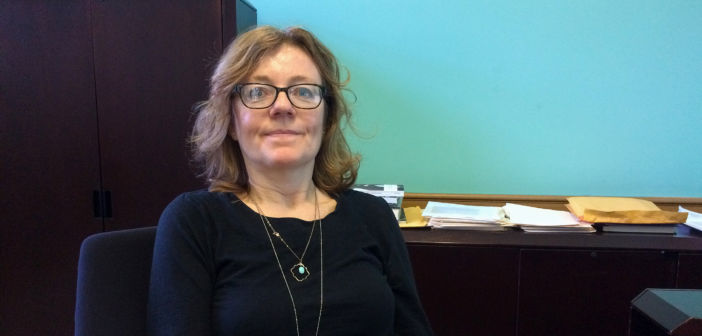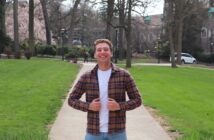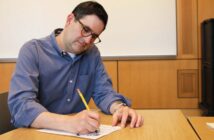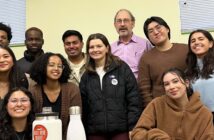Dawn Keetley remembers the first time she felt scared because of a TV show or movie.
Growing up in England, she would watch “Doctor Who” with her brother, and the Daleks — an extraterrestrial robot-looking race with a propensity to yell “Exterminate!” at their victims — would scare them.
They would hide behind the couch when Daleks showed up on the screen.
“Most people, even if they move past it, they remember watching some horror film when they were a teenager or sometimes younger than that,” Keetley said. “People remember the first horror movie they watched, and it has an impression on them.”
Now, Keetley is the chair of the English department at Lehigh and teaches classes on horror films and TV shows in the genre. Her research includes studying TV shows like “The Walking Dead,” “Dexter” and “American Horror Story.”
“Horror movies say a lot about who we are,” Keetley said. “I guess romantic comedies do too, to take another extreme. They say a lot about who we are, but I just don’t think that’s as interesting.”
Keetley has been teaching at Lehigh since 1999, but has only started to give classes in horror films within the last three years. Previously she taught courses in 19th century literature and American studies.
She said the idea to teach a class on horror films arose in a different class. She was using movies like “Black Swan,” where women have split personalities, in a 300-level Gothic literature course and realized it was interesting to teach through film. The next semester was the first time she offered her introduction to horror class.
Keetley said one of the challenges of teaching film was going beyond what people see at face value since, especially in horror movies, there is often a deeper meaning to the things presented in the movie.
“(Horror movies are) just really sensitive to two things: what scares us universally as humans and second, what scares us now,” Keetley said. “What anxieties and fears have we always had and what anxieties and fears do we particularly have right now? And I think those are both really interesting questions because horror has been around from the very beginning. I’m sure you could find cave paintings where primitive humans would draw on the wall the things that scared them.”
Ally Abramson, ’19, said Keetley was passionate about horror as a genre and helped students understand the underlying themes by giving them the historical context of the decade. Abramson said she took the class because other professors had recommended Keetley as a teacher, but she was not originally a fan of horror movies.
Outside of the classroom, Rachel Sholder, ’16, ’17G, says Keetley still stays in contact with her even though she isn’t her student anymore by sending her movie recommendations.
“From my first email with her we started talking about scary movies and formed a good professor-student relationship from there,” Sholder said.
Corey Schmalzle, ’17, said he took the class for fun and has a good relationship with Keetley. He said as an engineering student he felt as though he didn’t have a lot of meaningful interactions with his professors, but that was different with Keetley. He said she once read a 100-page screenplay he wrote and gave him pointers and advice.
“She really does care about the students and builds meaningful connections with us,” Schmalzle said.
Sholder took two of Keetley’s classes as an undergraduate student. She said she had seen many of the movies discussed in class previously, but Keetley gave her different perspectives as to what the movies were about.
Keetley said at the beginning of this decade there were many horror movies about haunted houses. While most wouldn’t look beyond what that means, Keetley said these movies played on the fears of that particular point in time, when people were scared of losing their houses because of the recession.
“It’s a genre film sort of like science fiction, so it’s really interesting to track the component parts of a horror film and how they stay the same across time,” Keetley said. “But also, how in different decades they get changed to suit the different purposes of the decade, like the social, political and economic things that are happening in any given decade.”
Keetley has also offered a class on the TV show Dexter, an 8-season series about a blood spatter expert who is also a serial killer.
With the “Dexter” class, she used to take a screenshot from a part of an episode and analyze the colors, the light and darkness and the use of blood in specific frames as part of the class’ discussion. Sholder said it was amazing to see how much Keetley could come up with from one still image of a show.
“‘Dexter’ especially is the kind of horror I like,” Keetley said. “The first four seasons especially are beautifully crafted and say a lot about human nature, what evil is and who is capable of it.”
Keetley is considered an expert on “The Walking Dead,” a zombie-apocalypse show, and is working on editing a collection of essays on the representation of race, gender and sexuality on the show — a widely debated topic. She said the show deals a lot with how people organize themselves socially and politically, in the wake of the dissolution of their government.
Keetley said the most interesting thing about researching and studying horror is what it says about ourselves.
“In a lot of horror films, the most frightening thing is us,” Keetley said. “You know, the depths of who we are, things we don’t know about ourselves, things we don’t know we’re capable of. I think that’s a lot of times what the monster is.”






Comment policy
Comments posted to The Brown and White website are reviewed by a moderator before being approved. Incendiary speech or harassing language, including comments targeted at individuals, may be deemed unacceptable and not published. Spam and other soliciting will also be declined.
The Brown and White also reserves the right to not publish entirely anonymous comments.
1 Comment
“‘Dexter’ especially is the kind of horror I like,” Keetley said. “The first four seasons especially are beautifully crafted and say a lot about human nature, what evil is and who is capable of it.”
I was not a Dexter fan. My recollection is that Dexter was an evil person who was always doing good. I like the idea of studying Dexter in an educational environment but I don’t like the program as it affects a viewer who does not critically view the program. The idea conveyed is not “what evil is and who is capable of it” but if your cause is just violence is justified. Who determines the justification? The evil person does. Not comforting.
In my opinion, often recent and current tv shows mean to confuse morality. They create an anything goes world which many real people attempt successfully to emulate. Do police who shoot unarmed victims watch too many cop shows?